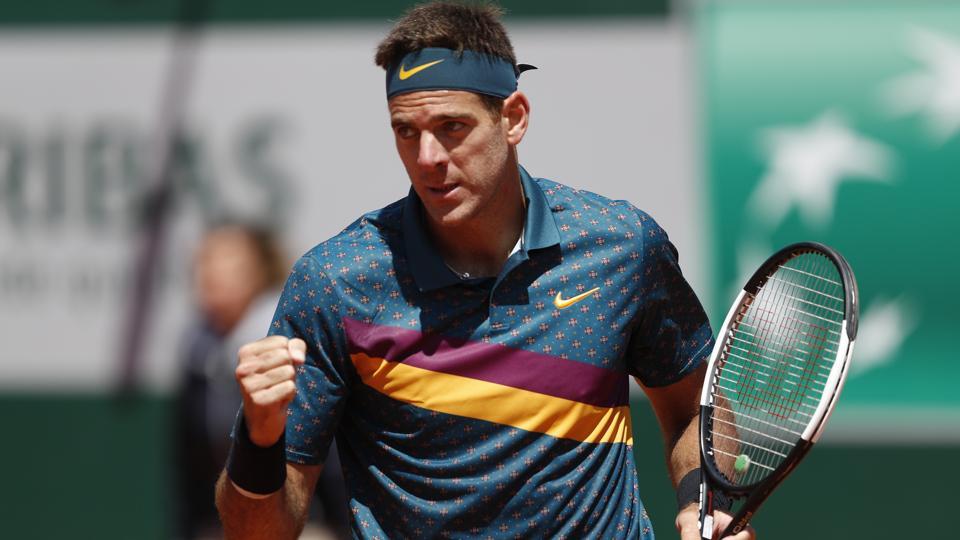Welcome to Tennis Elbow, the column that looks back on the week that was in the world of tennis. This week, Charles Blouin-Gascon gives Juan Martin del Potro his flowers while he still can.
Perhaps most shocking is how uncannily the injuries would come when he had been playing the best tennis of his life.
Seriously.
In August 2018, Juan Martin del Potro managed to reach a career-high ranking of world No. 3, after which he competed in Asia at the China Open and Shanghai Masters as he geared for the final run-in to the season. Much to his dismay, as well as that of pretty much everyone involved in tennis, del Potro had to withdraw from the rest of his playing schedule in 2018 with a knee fracture. (Which sounds god-awful.)
As the calendar turned to 2019, the injury lingered on and forced the tall Argentine to withdraw from event after event after event. Now here he is in Paris, competing in only his fourth event of the season, and del Potro finds himself in the Roland-Garros fourth round.
He’s playing youngster Karen Khachanov and by the time you read this, you’ll likely already know whether he’s won to make it to the quarterfinals, or lost. Whichever the case, this continues del Potro’s latest return from injury.
What’s utterly ridiculous is that this really is just par for the course for the 30-year-old: he plays well, then gets injured, misses time, rehabs and gets back to competition, before again getting injured. The man has been an absolutely formidable ambassador for the sport since turning pro in 2005, but you can probably say that it should have all been so much more.
Del Potro, if you recall, was the only man outside of Novak Djokovic, Roger Federer and Rafael Nadal to win a Grand Slam title to win a Grand Slam title between 2005 and 2013, when he captured the 2009 US Open by defeating Federer and Nadal. In other words, he was right there a decade ago, seemingly on the verge of toppling the duo at the top and undercutting the Djokovic reign before it even got started.
But alas, this wasn’t meant to be and, instead of one full of highlights and universal acclaim, del Potro’s career has been a study in perseverance and overcoming as overwhelming odds as the man’s forehand used to be.
There might not be a better place than the man’s rankings history page on the ATP website to tell the evolution of his career, as you can follow almost in real time the peaks and valleys he’s had to go through from his breakthrough at 21 years old and all the way to the present time.
After reaching No. 4 in April 2010, del Potro falls to 485 in January 2011 only to get all the way back to No. 4 again three years after that. Then comes purgatory, as the Argentine lingers out of action for so long that his highest ranking between November 3, 2014 and August 29, 2016 is at No. 135; his lowest point during that time is world No. 1,045 on February 8, 2016. Then he gets healthy again to compete and makes the jump to his aforementioned career-best No. 3 before getting injured again.
How does this happen? Well to get an idea, you can head to his Wikipedia page and search for, by clicking Control-F, either “wrist” or “injury.” You get 24 results for the former and 35 for the latter. It would be funny if it weren’t so sad and terrible.
When all is said and done, simply that he’s managed to make a name for himself is a major miracle. For the way he’s been forever gracious despite the persistent injuries, del Potro has been as beloved a figure as he is a towering one in tennis. Maybe you don’t root for him as your favourite favourite player but, like, he’s definitely someone you want to see do well—if only because we’ve only so rarely seen him do it.
What’s most striking about del Potro’s career is how profoundly human it is: it’s by no means a perfect, linear or even excellent one. But it’s a study in perseverance and courage, and as such it’s an inspiring one. And frankly it’s a deeply, deeply unique career because we doubt we’ll ever see another top player last a decade in the sport despite all the injuries and managing to make his way back to the Top 5 no fewer than three different times, or once more than he tumbled out of the top 100.
Should his career have amounted to more than the 22 career titles and more than $25 million in prize money? Perhaps, but that’s looking at it the wrong way: we should be thankful for all that del Potro’s career amounted to.
Here are your flowers, Juan Martin. Smell them while you still can.
Follow Charles Blouin-Gascon on Twitter @RealCBG




















